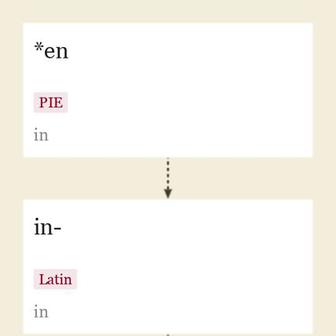inroad n.
1540s, "
Entries linking to inroad

element meaning "
In Old French (and hence in Middle English) this often became en-, which in English had a strong tendency to revert to Latin in-, but not always, which accounts for pairs such as enquire/inquire. There was a native form, which in West Saxon usually appeared as on- (as in Old English onliehtan "
Not related to in- (1) "
The trouble has continued in English; the hesitation over what is meant by inflammable being a commonly cited example. Implume (1610s) meant "
In addition to improve "
Middle English rode, from Old English rad "
In Middle English it was still, "
The meaning "
On the road "
"
updated on November 30, 2015